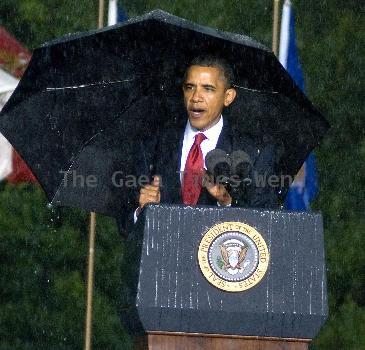In spite of concerns, White House says troop pullout in Afghanistan still set for July 2011
By Anne Gearan, APSunday, June 20, 2010
White House: Troop pullout still set for July 2011
WASHINGTON — The Obama administration reaffirmed Sunday that it will begin pulling U.S. troops out of Afghanistan next summer, despite reservations among top generals that absolute deadlines are a mistake.
President Barack Obama’s chief of staff said an announced plan to begin bringing forces home in July 2011 still holds.
“That’s not changing. Everybody agreed on that date,” Rahm Emanuel said, adding by name the top three officials overseeing the policy girding the war: Gen. David Petraeus, Defense Secretary Robert Gates and the chairman of the Joint Chiefs of Staff, Adm. Mike Mullen.
Petraeus, the war’s top military boss, said last week that he would recommend delaying the pullout if conditions in Afghanistan warranted it. Days after the date was announced in December, Gates pointedly said it was not a deadline.
Emanuel’s remarks reflect the White House view that Obama must offer a war-weary American public and Congress a promise that the nearly nine-year war is not open-ended. The problem, congressional Republicans and some military leaders say, is that a fixed date encourages the Taliban-led insurgency and undermines U.S. leverage with Afghan leaders.
Gates pledged Sunday that some troops would begin to leave in 13 months, but he was more cautious.
“We clearly understand that in July of 2011, we begin to draw down our forces,” Gates said. “The pace with which we draw down and how many we draw down is going to be conditions-based.”
Uniformed and civilian defense leaders accepted the announcement of a date to begin leaving as a condition of Obama’s major expansion of the war. Obama ordered an additional 30,000 troops, the last of whom are arriving now, with a mission to squeeze the Taliban on its home ground, build up Afghan security forces and improve chances that local people would swing behind the U.S.-backed central government.
With little progress apparent in the critical Taliban heartland of southern Afghanistan, the split between politics and tactics is again on display. As Gates acknowledged Sunday, it is taking longer than he hoped to gain an enduring edge over the Taliban in Helmand and Kandahar provinces.
Gates asked for time and patience to demonstrate that the new strategy is working. He lamented that Americans are too quick to write off the war when Obama’s revamped strategy has only just begun to take hold.
“It is a tough pull,” Gates said. “We are suffering significant casualties. We expected that; we warned everybody that would be the case last winter.”
At least 34 U.S. troops have died in Afghanistan this month, making June among the deadliest months of the war. Casualties are expected to rise through the summer and fall as fighting expands in Helmand and Kandahar.
Earlier this month, Gates said the United States and its partners must demonstrate progress this year or risk the collapse of already dwindling public support for the war.
Petraeus told Congress last week that he would recommend postponing the start of the withdrawal if security conditions and the capability of the Afghan government could not support it.
That does not mean Petraeus is opposed to bringing some troops home, and he said repeatedly that he supports Obama’s strategy. His caution, however, is rooted in the fact that the uniformed military — and counterinsurgency specialists in particular — have always been uncomfortable with fixed parameters for an inexact process of persuasion.
The war strategy Obama adopted is based on the success of Petraeus’ counterinsurgency tactics in the Iraq war. It combines a short-term “surge” of forces to blunt rising violence and a longer-term project to persuade locals to help uproot a homegrown insurgency.
Emanuel did not dispute quoted remarks from Vice President Joe Biden that “a whole lot” of forces would come home in July 2011. Biden, who argued within the administration for a narrower mission in Afghanistan involving fewer troops, was interviewed for the book “The Promise,” by Jonathan Alter.
Gates, however, said he had never heard Biden say such a thing, and that the evaluation by the on-the-ground war commander will largely determine the scope of the withdrawal.
“That absolutely has not been decided,” Gates said. “I’m not accepting, at face value, that … he said those words.”
Emanuel spoke on ABC’s “This Week.” Gates appeared on “Fox News Sunday.”
Tags: Afghanistan, Asia, Barack Obama, Central Asia, District Of Columbia, Kandahar, North America, Troop Withdrawals, United States, Washington




